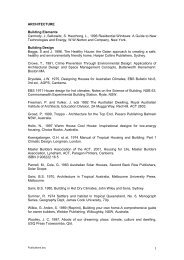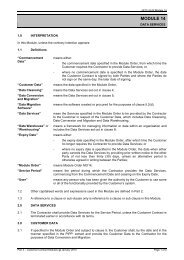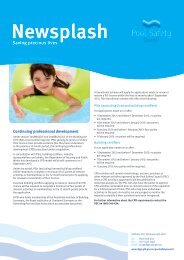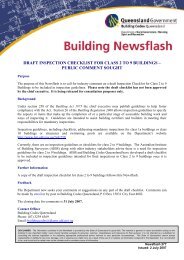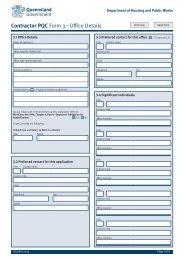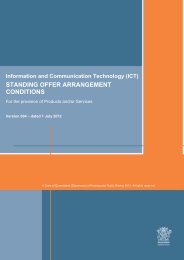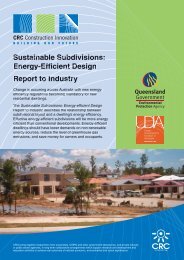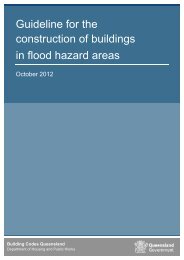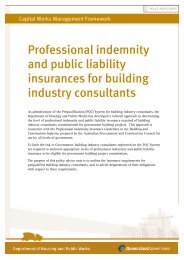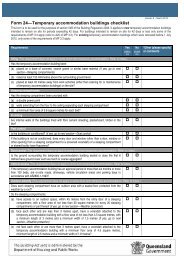Guidelines for pool owners and property agents - Department of ...
Guidelines for pool owners and property agents - Department of ...
Guidelines for pool owners and property agents - Department of ...
Create successful ePaper yourself
Turn your PDF publications into a flip-book with our unique Google optimized e-Paper software.
<strong>Guidelines</strong> <strong>for</strong> <strong>pool</strong> <strong>owners</strong> <strong>and</strong> <strong>property</strong> <strong>agents</strong> Page 29 <strong>of</strong> 56<br />
<strong>pool</strong> safety barrier, due to the significantly increased risk <strong>of</strong> child drowning associated with such<br />
doors.<br />
As disability exemptions are specific to a person, the exemption ends if the applicant stops being<br />
the <strong>pool</strong> owner or if the person with the disability no longer occupies the <strong>property</strong> or has recovered<br />
sufficiently to enable them to access the <strong>pool</strong> if it complied with the <strong>pool</strong> safety st<strong>and</strong>ard e.g. if the<br />
person recovered from a temporary disability.<br />
Local governments must keep a record <strong>of</strong> each exemption that is granted. Pool safety inspectors<br />
can check with the local government to confirm whether or not a disability exemption is in <strong>for</strong>ce.<br />
12.3 Impracticality exemptions<br />
Pool <strong>owners</strong> can apply to their local government <strong>for</strong> an exemption from complying with a part <strong>of</strong> the<br />
<strong>pool</strong> safety st<strong>and</strong>ard relating to barriers on the grounds <strong>of</strong> impracticality.<br />
The application must be accompanied by details identifying which part <strong>of</strong> the <strong>pool</strong> safety st<strong>and</strong>ard<br />
the owner is seeking exemption from <strong>and</strong> showing that compliance is not practical. Local<br />
governments can ask <strong>for</strong> further in<strong>for</strong>mation to establish that compliance is not practical.<br />
Impracticality exemptions cannot, <strong>for</strong> example, be given just because <strong>of</strong> aesthetics, because no<br />
children reside on or visit the <strong>property</strong>, or because the <strong>property</strong> is rural or remote.<br />
Local governments can only grant an impracticality exemption to the extent reasonably necessary<br />
to overcome the impracticality associated with compliance. For example, if the only impracticality<br />
issue relates to space <strong>for</strong> a gate to open outwards, the exemption could not extend to matters not<br />
relating to the gate.<br />
The legislation gives local governments a range <strong>of</strong> considerations when assessing these<br />
exemptions, including whether compliance would require the owner to:<br />
• move or demolish a building or part <strong>of</strong> a building<br />
• change the location or size <strong>of</strong> the <strong>pool</strong><br />
• remove vegetation protected from removal under an Act or a local law.<br />
Local governments can also consider the cost <strong>of</strong> the barriers or work required to comply with the<br />
<strong>pool</strong> safety st<strong>and</strong>ard, having regard to the nature <strong>of</strong> any existing barriers <strong>for</strong> the <strong>pool</strong>. However,<br />
local governments are likely to carefully consider whether the cost <strong>of</strong> installing the barriers is<br />
significant enough to warrant an exemption at all. The legislation also provides scope <strong>for</strong> local<br />
governments to consider any other matters they consider relevant.<br />
Unlike disability exemptions, impracticality exemptions continue until the exemption is revoked by<br />
the local government. Any conditions applicable to the exemption are also binding on the<br />
successors in title.<br />
Local governments are required to consider the exemption application <strong>and</strong> provide a decision<br />
within 40 business days. The exemption can be granted subject to reasonable conditions the local<br />
government considers necessary or desirable to prevent a young child accessing the <strong>pool</strong>.<br />
Written notice <strong>of</strong> the decision must then be given to the <strong>pool</strong> owner <strong>and</strong> also to the department<br />
within 10 business days after the exemption is granted to allow the <strong>pool</strong> safety register to be<br />
updated.<br />
The applicant can appeal against the local government’s decision to a building <strong>and</strong> development<br />
dispute resolution committee. The appeal must be made within 20 business days after the decision<br />
notice is given. For further in<strong>for</strong>mation about how to appeal, contact the Building <strong>and</strong> Development<br />
Dispute Resolution Committees (<strong>for</strong> contact details see section 8.9).<br />
Building Codes Queensl<strong>and</strong>



